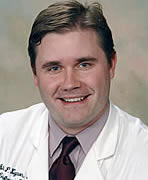OFF-THE-SHELF VEINS
ECU studying bioengineered blood vessels for surgery
Physicians at East Carolina University and Yale University are working together to engineer blood vessels that could be used in coronary artery bypass surgery.

Kypson
Dr. Alan P. Kypson, a surgeon and associate professor of cardiovascular sciences at ECU, and Dr. Laura Niklason, a professor of anesthesiology and biomedical engineering, vascular biology and therapeutics at Yale, are working to expand previous research they have done on tissue-engineered blood vessels.
Their research is funded by a four-year, $2.34 million grant from the National Institutes of Health.
Previous research by Kypson, Niklason and colleagues was published last year in Science Translational Medicine.
In this research, scientists generated bioengineered veins in a bioreactor – a device designed to support a biological environment — and then stored them up to 12 months in refrigerated conditions. The bioengineered veins, 3 millimeters to 6 millimeters in diameter, demonstrated excellent blood flow and resistance to blockage in large animal models for up to a year.
The American Heart Association Update on Heart Disease Statistics reports that in 2007, in the United States, surgeons performed more than 400,000 coronary bypass procedures. Patients requiring bypass surgery may not have suitable veins or arteries available and are not candidates for synthetic grafts because of the size needed for grafting.
Kypson said bioengineered veins could be a useful, potentially life-saving tool for people who need a coronary bypass but don’t have suitable veins of their own. It also avoids possible complications from harvesting a vein from a patient’s leg.
The grant is an “R01” grant, the highest level of grant funding awarded by the NIH to academic researchers. It is the first R01 grant awarded to the ECU Department of Cardiovascular Sciences since the department was formed in the late 2000s.